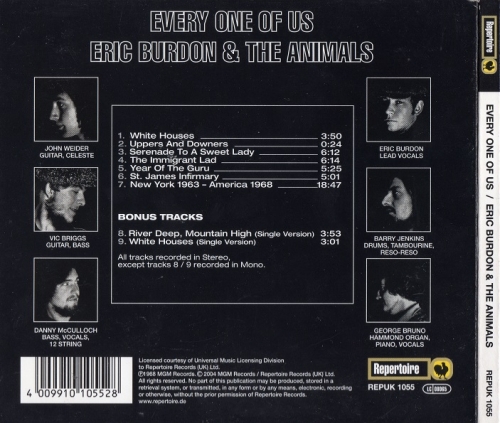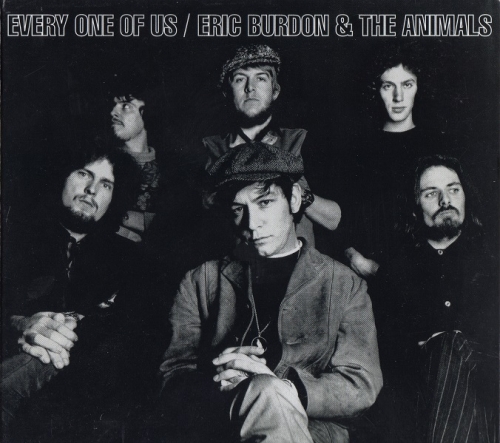
Eric Burdon & The Animals - Every One Of Us (Reissue, bonus tracks) (1968/2004)
BAND/ARTIST: Eric Burdon & The Animals
- Title: Every One Of Us
- Year Of Release: 1968/2004
- Label: Repertoire Records
- Genre: Rock, Blues Rock, Psychedelic Rock
- Quality: Flac (image, .cue, log)
- Total Time: 53:03
- Total Size: 381 Mb (scans)
- WebSite: Album Preview

Tracklist:
01. White Houses 3:52
02. Uppers And Downers 0:26
03. Serenade To A Sweet Lady 6:14
04. The Immigrant Lad 6:16
05. Year Of The Guru 5:27
06. St. James Infirmary 5:03
07. New York 1962 - America 1968 18:49
Bonus Tracks:
08. River Deep, Mountain High (Bonus Track) (Single Version) 3:55
09. White Houses (Bonus Track) (Single Version) 3:01
Eric Burdon & the Animals were nearing the end of their string, at least in the lineup in which they'd come into the world in late 1966, when they recorded Every One of Us in May of 1968, just after the release of their second album, The Twain Shall Meet. The group had seen some success, especially in America, with the singles "When I Was Young," "San Franciscan Nights" and "Sky Pilot" over the previous 18 months, but had done considerably less well with their albums. Every One of Us lacked a hit single to help drive its sales, but it was still a good psychedelic blues album, filled with excellent musicianship by Burdon (lead vocals), Vic Briggs (guitar, bass), John Weider (guitar, celeste), Danny McCulloch (bass,12-string, vocals), and Barry Jenkins (drums, percussion), with new member Zoot Money (credited, for contractual reasons, as George Bruno) on keyboards and vocals. Opening with the surprisingly lyrical "White Houses" -- a piece of piercing social commentary about America in early 1968 -- the record slid past the brief bridge "Uppers and Downers" and into the extended, John Weider-authored psychedelic mood piece "Serenade to a Sweet Lady," highlighted by Briggs' superb lead acoustic guitar playing and Weider's subdued electric accompaniment. This is followed by the acoustic folk piece "The Immigrant Lad," a conceptual work that closes with a dialogue, set in a workingman's bar, in which two Cockney workers, voiced by John Weider and Terry McVay, talk about their world and their lives. "Year of the Guru" is another in a string of Jimi Hendrix-influenced pieces by this version of the Animals, showing the entire band at the peak of their musical prowess, and Burdon -- taking on virtually the role of a modern rapper -- generating some real power on some surprisingly cynical lyrics concerning the search for spiritual fulfillment and leaders. "St. James Infirmary" recalls "House of the Rising Sun," as both a song and an arrangement, and is worthwhile just for the experience of hearing this version of the group going full-tilt as a rock band. And then there is "New York 1963 -- America 1968," an 18-minute conceptual track with a center spoken word section featuring not a group member, but a black engineer named Cliff, who recalls his experience as a fighter pilot during World War II, and tells of poverty then and now -- although the opening section starts off well enough musically, amid Burdon's sung recollections of coming to America and his fixation on the blues and black music in general, and the closing repetition of the word "freedom" anticipates Richie Havens' famed piece (actually an extension of "Motherless Child") from Woodstock, the track is too long and unwieldy for any but the most fanatical listener to absorb as more than a curiosity of its time. In fairness, it must also be said that Burdon's mixing of politics and music, social criticism and art, however inappropriate as pop music for a mass audience, was out in front of most of the competition during this period, in terms of boldness and reach, if not grasp. The extended jamming on this and the other songs also highlighted a fundamental problem that afflicted this version of the Animals from the get-go, the fact that they were touring too much to write enough songs to properly fill their albums, which meant extending the instrumental portions of everything that was on them, in order to fill up the running time; this group had the musicianship and talent to pull it off totally successfully in all but one instance here. This album would be one of the last times that this lineup of the group would appear on record -- Briggs and McCulloch would leave later in the year, both to be replaced by Andy Somers (aka Andy Summers), and the group as a whole would pack it in with the waning of 1968.
Blues | Oldies | Rock | FLAC / APE | CD-Rip
As a ISRA.CLOUD's PREMIUM member you will have the following benefits:
- Unlimited high speed downloads
- Download directly without waiting time
- Unlimited parallel downloads
- Support for download accelerators
- No advertising
- Resume broken downloads


